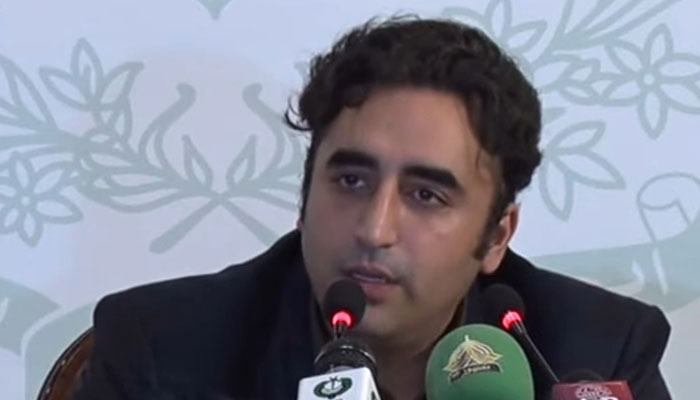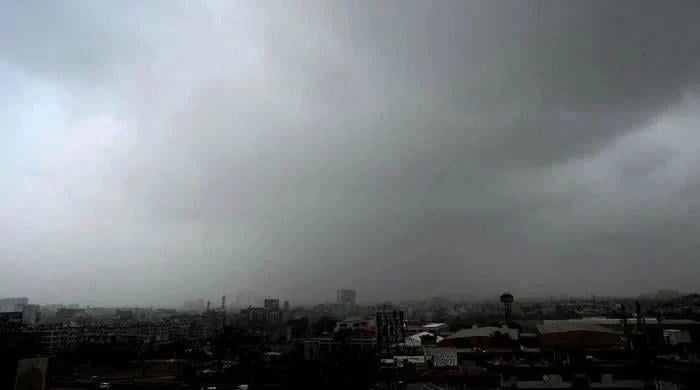Modi on path to become ‘Butcher of Kashmir’ after committing Gujarat massacre: Bilawal
FM says India had not only violated international laws, UNSC resolutions but also bilateral pacts between two countries
August 10, 2023

- We should not expect anything good from Narendra Modi: FM Bilawal.
- Says no space left for Pakistan to meaningfully engage with India.
- "Pakistan is not interested in the bloc politics."
Lashing out at Indian Prime Minister Narendra Modi for grave human rights violations, atrocities and annexation of Indian Illegally Occupied Jammu and Kashmir (IIOJK) by revoking its special status in 2019, Foreign Minister Bilawal Bhutto-Zardari on Wednesday said that the “Butcher of Gujarat” will become a slaughterman of the disputed territory.
Addressing a presser to highlight the achievement of the Ministry of Foreign Affairs during his tenure, Bilawal reiterated that Pakistan’s stance over its relations with India was very clear and consistent; unless it revoked its illegal and unilateral acts of 2019 over occupied Jammu and Kashmir, there was no space to meaningful engagement, APP reported.
India had not only violated international laws and the United Nations Security Council resolutions but also the bilateral agreements between the two countries, he added.
“There is no space left for Pakistan to meaningfully engage with India,” the foreign minister added.
Bilawal said he had already maintained during the previous government’s tenure that they should not expect anything good from Modi, who was a "butcher of Gujarat" and was quite different from Vajpayee and Manmohan Singh.
SCO summit
Kashmir issue had been a consistent component of the foreign policy, he said and enumerated Pakistan’s efforts to address issues of Islamophobia and desecration of the Holy Quran, leading to the adoption of a resolution by the UN Human Rights Council.
To a quarry, the foreign minister said he went to Goa to attend Shanghai Cooperation Organisation (SCO) meeting despite serious reservations and carrying head money, to present Pakistan’s stance and tried to utilise the space available for the pronounce Pakistan’s interests.
He said due to his participation in SCO where he presented Pakistan’s stance clearly, India went on the back foot and held the SCO heads of states summit virtually.
About sending Pakistan national team to contest the ICC Cricket World Cup in India, he said contrary to India’s indulgence in immature acts, Pakistan always maintained that there should be a difference between politics and sports, adding that they still had security concerns as the security of the national team could not be compromised; and they had conveyed such to the ICC and India.
Pakistan was not interested in the bloc politics and did not want to be part of any polar world because they wanted to serve their 224 million population, he said, adding that if they were drawn into others’ interests, then they would be distracted.
Uptick in terror incidents
Responding to a question about Afghanistan, the foreign minister said that certain opinions were being formed across the world on the basis of ground realities.
If they wanted diplomatic recognition, the Afghan interim government would have to address the international concerns, but if they continued with their statements, it would create complications and the Afghan people would continue to suffer, he added.
The foreign minister said that after the fall of Kabul, there was a sharp spike in terrorist incidents in Pakistan and stressed that cooperation and engagement between the two countries was necessary to tackle the issue.
He said Pakistan remained engaged with the Afghan leadership. About women’s education issue, he said, Pakistan had a very open and clear stance.
Terming the fight against terrorism as their own fight, the foreign minister said that Pakistan had been the largest country in the world affected by the curse of terrorism.
He said that they wanted to save the next generations and would not allow the enemies of the religion, country and people to cause any further harm.
The foreign minister also expressed strong opposition to the previous government’s policy over the terrorists hiding in Afghanistan.
The foreign minister expressed the satisfaction that at the diplomatic front, they moved ahead with ‘damage control’ during the last 16 months.
He regretted that the PTI’s government had caused damage to the country’s relations with world capitals and strongly disagreed with the gesture of the former prime minister waving a letter sent by the EU in public.
Ukraine conflict
About the Russia-Ukraine conflict, he said that Pakistan wanted a peaceful resolution of the issue.
He said they did not want to see the relationship with Russia through the prism of the ongoing issue, as they wanted to collectively unlock the immense potential between the two countries. They prayed that diplomacy and peace would prevail, he added.
The foreign minister said Pakistan was committed to the Pakistan-Iran gas pipeline for the mutual benefit of the people of the two countries.
Earlier, the foreign minister highlighted the achievements of his ministry on the diplomatic fronts and global fora with increased outreach and extensive engagements with the international community.
He said Pakistan engaged with the US, Europe and the UK through bilateral and multilateral meetings.
Removal from FATF’s grey list and hosting of the Geneva conference were some of the conspicuous achievements for f Pakistan, he added.
Visa facilitation and cooperation in science and technology resulted in the opening of doors for Pakistanis seeking jobs abroad, he said, adding they had corrected the diplomatic course.
The foreign minister said that during his tenure in office, they never compromised on the core issue of Kashmir and effectively advocated for the oppressed people of Kashmir at all fora.
The foreign minister thanked the UN Secretary-General for his efforts to support Pakistan during last year’s floods.
He said that they would provide 2 million climate-resilient houses to the flood-affected people in Sindh, adding that a huge number of educational institutions and roads network were also affected by that natural calamity.
— With additional input from APP









